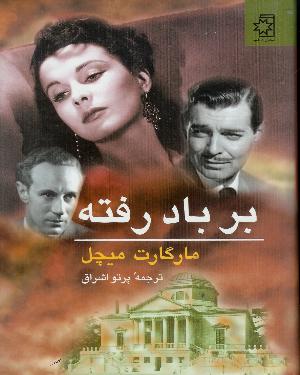(بر باد رفته (۲ جلدی
این کتاب در دو جلد درباره جنگ شمال و جنوب آمریکا است. داستان در آمریکای جنوبی اتفاق می افتد. اسکارلت اوهارا دختری زیبا از یک خانواده متمول جورجیاست. او عاشق اشلی ویلکز است. روزی شنید که او می خواهد با دوشیزه ملانی ازدواج کندو و چند روز بعد جنگ شروع شد. اسکارلت اوهارا، دختری جوان و بسیار زیبا از خانواده ای ثروتمند (البته برده دار در جنوب) است که قلب بسیاری از جوانان اشراف را در تسخیر خود دارد ولی خودش گرفتار عشق یکی از جوانان اشراف به نام اشلی است و… داستان در واقع تأملی جدی بر عشق و پایداری است. تأملی بر عشق است چرا که اسکارلت در پایان ماجرا در می یابد اشلی را به اندازه رت باتر (شوهر سوم خودش) دوست نداشته و ندارد و تأملی بر بردباری است چرا که لشگری از اتفاقات ناگوار (جنگ شمال و جنوب آزادی برده ها، مرگ شوهر اول و دوم زن جوان، مرگ دختر کوچکش، از دست دادن پدر و مادر و…) یکی پس از دیگری و آن هم برای دختری که در ناز و نعمت بزرگ شده است، اتفاق می افتد ولی دختر جوان همه را با صبر و استقامت و بردباری تحمل کرده و پشت سر می گذارد و حتی در پایان داستان که همسرش وی را ترک می کند خود را نمی بازد بلکه می گوید: امشب در این باره فکر نمی کنم، باشد برای فردا چرا که فردا هم روزی است!. نظام برده داری آمریکا، نبرد شمال و جنوب دست یافتن سیاهان به آزادی و حق رأی و جنبش ضد سیاه نقابداران فولکوسکوئن (که در میان آنها از رئیس پلیس تا کشیش شهر هم دیده می شد!)، شکل گیری ظلم سرمایه داری در آمریکا و تبدیل نظام فئودالی (زمین داری) به سرمایه داری صنعتی و تجاری و دورنماهایی که تبدیل به نظم سرمایه داری فعلی آمریکا و زیرساخت اجتماعی و فرهنگی آن شد همه و همه در غالب تقابل شخصیت های داستان و سیر حوادث به نمایش درآمده است.
It took this reviewer half a century to get around to reading this great novel for the first time! Appreciating it then, with `fresh eyes` I share the view that `Gone With The Wind` is quite simply the most readable long novel of all time. With world-wide sales nudging 25 million, it`s probably fair to say that most first-time readers (apart from the odd reviewer here at the world`s biggest web site) have shared that opinion in the almost 70 years since Margaret Mitchell wrote her one-and-only book. At least one other, highly readable novelist of the past century, the late James A. Michener certainly felt that way. I`m recalling an interview of thirty years ago in which Michener – a master storyteller in his own right – expressed awe at Mitchell`s achievement. I remember Michener quoted a long-forgotten critic who greeted the book`s release in 1936 with the perfect, one-sentence summing up: `It`s the shortest long novel I have ever read!` Michener predicted at that time (1975) that `critics will forever have to grapple with the problem of why Margaret Mitchell`s novel has remained so readable, and so important to so many people.` Michener singled out a few of the `super-dramatic confrontations` so perfectly conjured up in Mitchell`s lucid, timeless writing style: Mammy lacing Scarlett into her corset; the wounded at the railway station; Scarlett shooting the Union straggler; the girls making Scarlett a dress from the moss-green velvet draperies; Rhett carrying his wife upstairs to the long-unused bedroom. Yet for all of its amazing drama, the novel does not ultimately depend upon major confrontations for its page-turning momentum: Michener I remember, zeroed in on two `central` paragraphs which provide the reader with perfect glimpses into the way the two major characters have `grown` before our eyes within these pages. One of these paragraphs captivates our imagination in about the middle of the book (chapter 29): `Somewhere, on the long road that wound through those four years, the girl with her sachet and dancing slippers, had slipped away, and there was left a woman with sharp green eyes, who counted pennies and turned her hands to many menial tasks, a woman to whom nothing was left from the wreckage, except the indestructible red earth on which she stood.` And, in the final pages, that indelible portrait or Rhett, age forty-five: `He was sunken in his chair, his suit wrinkling untidily against his thickening waist, every line of him proclaiming the ruin of a fine body and the coarsening of a strong face. Drink and dissipation had done their work on the coin-clean profile, and now it was no longer the head of a young pagan prince on newly minted gold, but a decadent, tired Caesar on copper debased by long usage.` It`s true to say (again as Michener noted thirty years ago) that the weakness of `Gone With The Wind` is the almost exclusive focus on Atlanta, ignoring the rest of the South: When in fact, it was really the ENTIRE South that changed, altered by war, and defeat, and social upheaval – and stark determination to re-establish iteself.` Michener astutely observed that GWTW `depicts with remarkable felicity, the spiritual history of a region.` Most everyone these days would concede that Margaret Mitchell`s personal views on the `liberation of the former slaves` (as expressed in subsequent interviews) were less than compassionate. Nevertheless, it was NOT Mitchell who composed those words which make some of us wince when they`re scrolling up the screen in the movie version – words quaintly poetic perhaps, but manifestly insulting to those Americans whose ancestors never mistook the days of slavery as part of some `pretty world` poignantly longed-for, or in some way better than America today. (This reviewer has a pretty good memory for well-cadenced English prose, and this is his memory of those opening words from some anonymous male screenwriter.) `There was a land of cavaliers and cotton fields called the `Old South.` Here, in this pretty world, gallantry took its last bow. Here was the last ever to be seen of knights and their ladies fair, of master and slave. Look for it only in books, for it is no more than a dream remembered, a civilization gone with the wind.` So much better are the novelist`s own words, distilled into so many sentences and paragraphs that positively `sing` in our memory. Like this one: `He swung her off her feet into his arms and started up the stairs. Her head was crushed against his chest and she heard the hard hammering of his heart beneath her ears. He hurt her and she cried out, muffled, frightened. Up the stairs, he went in the utter darkness, up, up, and she was wild with fear.` Or this: `Hunger gnawed at her empty stomach again, and she said aloud: `As God is my witness, as God is my witness, the Yankees aren`t going to lick me. I`m going to live through this, and when it`s over, I`m never going to be hungry again. No, nor any of my folks. If I have to steal or kill – as God is my witness, I`m never going to be hungry again.`








